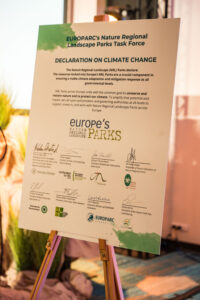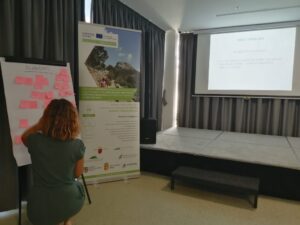Where Sports and Nature Meet
Stakeholders from the outdoor sports, education, environment, and EU political sectors gathered in Munich from November 13th to 15th for the closing event of the EU Erasmus+ project – Sustainability and Environmental Education in Outdoor Sports (The SEE Project). The project partners were thrilled to celebrate the completion of four impactful project reports, a European best practices guide, and an Educational Toolkit after three years of hard work.
Make sure to take a peek at our virtual photo album to get a closer look at all the exciting activities that took place at the SEE Symposium:
The learning symposium provided an excellent opportunity for an international audience from both the outdoor sports and environmental protection sectors to come together, share ideas, transfer knowledge, and work on future collaborations.
The two-day program allowed participants to delve deeper into key topics related to outdoor sports and Protected areas.
Interactive and Deep Dive sessions
As part of the Interactive and Deep Dive sessions, participants had the opportunity to exchange ideas on a number of topics, including:
- Community engagement and social conflicts
- Littering
- Nature connection
- Dealing with impacts
- Equipment and consumption
- Overcrowding
- Climbing specific activities
- Values and raising awareness
- Cooperation between Nature and Sport
- Communication
- Inclusion
Participants also got hands-on experience with the Toolkit through several practical workshop sessions, including testing toolkit activities. They also got inspired by inspirational talks from game changers in environmental activism.
New Declaration: Europe’s Nature Regional Landscape Parks unite for Climate & Biodiversity Action!
The NRL Task Force signed the Climate Declaration at the EUROPARC Conference 2023 in The Netherlands. Picture: PDF-Grafie
Europe’s Nature Regional Landscape (NRL) Parks unite to tell policymakers: we are ready to combat climate change, biodiversity loss and habitat degradation! In the NRL Parks Climate Declaration, they underline that the time is now to invest in these Parks to help them reach their full potential for nature & for people.
If not now, then when? If not us, then who?
Climate Change Adaptation in Europe’s Living Landscapes.
Climate change is a major driver of biodiversity loss. At the same time, the loss of biodiversity accelerates climate change processes. Both are major threats to life on earth and must be addressed through international cooperation and joint action.
Across Europe, the vibrant network of Nature Regional Landscape Parks (NRL) is already implementing integrated, forward-looking measures for a sustainable Europe for nature and people.
The resources locked into Europe’s NRL Parks are a crucial component in ensuring a viable climate adaptation and mitigation response at all government levels.
However, on their journey to adaptation and mitigation, the NRL Parks are confronted with various challenges:

The signed Declaration at the EUROPARC Conference 2023. Picture: PDF-Grafie.
- Strong need to identify the most impactful measures for each context and region to address climate change;
- Limited resources and need for public funding to implement measures;
- Different political and administrative responsibilities for climate protection and nature conservation require a high level of communication;
- Lack of evaluation measures, which assess the existing nature conservation actions being implemented;
- Change of species composition, which leads to a need to identify flagship species and habitats under the EU Birds and Habitats Directives that are most vulnerable to climate change;
- No official functions in the administration processes (e.g. spatial planning) due to limited passage rights on land;
- Conflicting land use objectives (e.g. renewable energies vs. nature conservation or the use of agricultural marginal land for renewable energies as photovoltaic panels, which, however, can often be of high nature conservation value).
For this reason, EUROPARC’s Nature Regional Landscape Parks Task Force developed Europe’s Nature Regional Landscape Parks Declaration on Climate Change. The Declaration was officially signed by the members of the EUROPARC Taskforce for Nature Regional Landscape at the annual EUROPARC Conference 2023 in Leeuwarden, the Netherlands.
NRL Parks across Europe unite with the common goal to conserve, restore nature and to protect our climate. With this declaration, the parks call upon policymakers and governing authorities at all levels to support, invest in, and work with the Nature Regional Landscape Parks across Europe.
With this declaration, NRL Parks manifest their vision and strengths to address both the climate and biodiversity crisis at the same time. Clear action points and needs are defined.
What are the next steps?
To reach their full potential in accelerating climate change actions and combat biodiversity loss, NRL Parks need the support from national and regional policymakers and governing authorities. Driven by the EUROPARC Taskforce for Nature Regional Landscape, the topic will be addressed on national and regional levels. The Taskforce will build on previous work conducted by the LIFE Natur’Adapt project and create synergies with the EUROPARC Taskforce on Climate Change.

Interreg Europe GREENHEALTH – six months after the Kick-Off Meeting

Six months ago, on the 11 of May, we reported on the Kick-Off Meeting of the Interreg Europe GREENHEALTH in Murcia, Spain.
The GREENHEALTH project wants to create linkages between health and environmental policies and incorporating human health initiatives into Protected Area programmes.
The first six months have been ones of intense work, dialogue, capacity building and communication among the partners and with key stakeholders. The first exchanges and intentions were established at regional level to trigger and showcase the potential that each region can generate in the field of biodiversity and health.
What happened in the cooperating regions?
Each partner institution established the so called “Local Living Labs” (LLL) in their region or area of operation. LLL are “spaces” where each project partner can meet their key stakeholders and discuss the existing and potential initiatives that can take place in their area of operation both in the short and long term.
Each project partner organised two Local Living Labs in their own region. If the first LLL was about introducing the project to key interlocutors, the second one focused on sharing the knowledge of what are the existing initiatives in the regions and which potentials are still not exploited or are under-utilised. What are the strengths, weaknesses, opportunities and threats for each region? Each partner conducted a SWOT analysis alongside a regional study.

The methodology to create this baseline was developed by EUROPARC Spain, in consultation with EUROPARC Federation and the HPHPe Commission. EUROPARC Spain has supported the Lead Partner technically and is also consolidating the results emanating from each region. An online creative thinking and discussion forum took place at the end of October to discuss the preliminary results of the analysis, which is the base for a roadmap.
Most project partners also organised regional launching conferences.
The role of EUROPARC Federation and the Healthy Parks Healthy People Europe (HPHPe) Commission
But what did the work of EUROPARC Federation consisted on in the first semester? And what was the contribution of the HPHPe Commission to the project?
EUROPARC Federation is advisory partner for communication, capacity building and engagement.
The HPHPe Commission strongly backed the partnership by providing training during the Kick-Off-Meeting and through an online session on the HPHPe programme and toolkit. The latter represent a compass, which underpins the GREENHEALTH methodology to identify good practices in different regions. The HPHPe tools are also showcasing the enabling cooperation factors to effectively implement regional initiatives triggering health and biodiversity outcomes alike.
On the communications side, EUROPARC Federation supported the consortium by developing a first communication strategy.
The main deliverables include (but are not limited to): the establishment and upkeep of Social Media channels (Instagram, X and YouTube), the first newsletter and project video (both in six languages), the organisation of two online sessions for partners on communication and stakeholder engagement. The project website, hosted by the Interreg Europe Programme, was also populated and updated.
To share information about GREENHEALTH within our network, we took the chance to give information about the project during the EUROPARC Conference 2023 marketplace and provided a session about Wild Ways Well to Wellbeing in the HPHPe walk-shop.
What now?
EUROPARC Federation, hand-in-hand with the HPHPe Commission is preparing for the first Inter-Regional Learning Event in Croatia. Here the partners will have the chance to showcase best practices from their regions in the first thematic area of the project “Management of Protected Areas”.
Update December 2023: the Event Report is being finalised.
Stay tuned and check https://www.interregeurope.eu/greenhealth
Join the HPHPe online community!
We have a LinkedIn group and are happy to have you onboard 🙂
The Nature Restoration Law is alive
After months of discussions, on 09.11.2023, the EU Parliament, Commission and Council have concluded discussions on the Nature Restoration Law during the so-called ‘trilogue negotiations’.
The Nature Restoration Law is closer to becoming reality
Late Thursday night, the intense negotiations between the EU Parliament, Commission, and Council concluded on the eagerly awaited Nature Restoration Law, resulting in a political agreement between the three institutions. So, where does this leave Protected Areas?
EUROPARC is pleased to see that after the trilogue negotiations some core elements are back in the legislative proposal. In particular restoration measures won’t be exclusively implemented in Natura 2000 areas and restoration targets for farmlands and drained peatlands are again part of the proposal. For Protected Areas this means confirming their role to plan and manage nature restoration and at the same time to inspire, with good practices, broader landscape restoration processes outside of their borders, successfully reconciling biodiversity conservation requirements with the productive function of agricultural landscapes.
Says EUROPARC President Michael Hošek. He continues stating that:
While the proposal contains many exceptions and reduced ambitions over a longer period of time, it is still a powerful tool. Its implementation will ultimately be a matter of agreement with the EU Member States, and their approach will determine how the Nature Restoration Law will be implemented to successfully achieve the targets set. And in this respect we, as the EUROPARC Federation, are ready to support the whole process.
Earlier this year, EUROPARC joined 210 other civil society organisations in a call upon all EU Member States, Members of the European Parliament and the European Commission to urgently adopt a strong Nature Restoration Law that is fit for purpose to tackle the twin biodiversity and climate crises.
Read EUROPARC’s previous article on the #RestoreNature campaign
The agreement reached must now be endorsed by Member States, as well as undergo a crucial vote by the EU Parliament’s Environment committee. If the proposal successfully navigates these steps, it will subsequently go through a final rubber-stamp vote during the Parliament’s plenary vote, expected to take place in December 2023.
We now call on Member States and the EU Parliament to approve this trilogue agreement, and not delay the much-needed restoration work that will help the EU fight the climate and nature crisis.